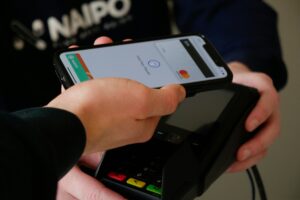Credit card payments are gaining in popularity, offering an easy and secure method of payment without the need for cash.
In 2023, 65% of all Guidap transactions were carried out by card, either online or via an electronic payment terminal (EPT).
This service, which is practical for consumers, nevertheless comes at a considerable and often opaque cost, borne by the merchant with each transaction.
In this article, we'll try to shed some light on how these transactions are billed, by focusing on the model most widely used in the hobby: Interchange Plus Plus (IC++).
In view of the complexity of the subject, we have simplified the concepts at the risk that the information may not be entirely accurate. We cite all our sources at the end of the article, so that you can deepen your knowledge if you wish.
The basics of IC++ (Interchange Plus Plus) billing
In France, the IC++ pricing model is the most widely used in the payments sector. In theory, this approach offers transparency on the costs charged by each party involved in the transaction.
In the Interchange Plus Plus model, transaction processing involves three types of fees:
- Interchange fees charged by the consumer's or cardholder's bank (this is the "Interchange" part of "Interchange Plus Plus").
- Scheme fees charged by Visa or Mastercard (this is the first "Plus" in "Interchange Plus Plus")
- Acquirer markup, usually your bank (this is the second "Plus" in "Interchange Plus Plus")
How are Interchange Plus Plus fees determined?
Interchange and Operator fees vary according to variables such as the type of user (private or corporate), the type of program (debit, credit, prepaid), the payment zone (Intra or Extra Europe), the type of use (POS, E-commerce, contactless). These fees are regulated by law and are therefore non-negotiable.
Acquirer fees are fixed between you and your bank through a VADS (Vente À Distance Sécurisée) contract in exchange for its mandatory services. The law prohibits merchants from collecting money themselves, to prevent money laundering. The acquirer (your bank) will be responsible for processing all payments, refunds and disbursing the money to you. For these services, your bank will charge you a fee, levied on each transaction.
Together, the Interchange, Operator and Acquirer fees make up what we call the Transaction Acquisition Fee. Let's see how these costs can vary according to 3 possible scenarios.
3 scenarios for the application of Interchange ++ sales charges in leisure activities
For our 3 scenarios, we will take into account the following IC++ rate schedule:
| Europe | Interchange | Operator | Purchaser | |
|---|---|---|---|---|
| Individuals | Flow | 0,20% | 0,01% | 0,64% |
| Credit | 0,30% | 0,02% | 0,84% | |
| Professionals | Commercial | 1,30% | 0,02% | 1,54% |
| Outside Europe | 1,65% | 0,85% | 2,00% |
Scenario 1: A private customer buys 4 Accrobranche tickets for €100. How much does the Adventure Park pay for this transaction?
We apply (debit card Europe).
- Interchange fee: 0.20% = €100 x 0.20% = €0.20
- Operator fee: 0.01% = €100 x 0.01% = €0.01
- Purchaser's fee: 0.64% = €100 x 0.64% = €0.64
Total cost of transaction acquisition fees: €0.20 + €0.01 + €0.64 = €0.85
Scenario 2: A company organizes a teambuilding event and uses the company card to pay €100 for a canoe trip. How much does the canoe base pay for this transaction?
We apply (Europe business card).
- Interchange fee: 1.30% = €100 x 1.30% = €1.30
- Operator fee: 0.02% = €100 x 0.02% = €0.02
- Buyer's fee: 1.54% = €100 x 1.54% = €1.54
Total transaction acquisition costs: €1.30 + €0.02 + €1.54 = €2.86
Scenario 3: A non-European foreign tourist buys a kitesurfing lesson for €100. How much does the kitesurf school pay for this transaction?
We apply (card outside Europe).
- Interchange fee: 1.65% = €100 x 1.65% = €1.65
- Operator fee: 0.85% = €100 x 0.85% = €0.85
- Purchaser's fee: 2.00% = €100 x 2.00% = €2.00
Total transaction acquisition costs: €1.65 + €0.85 + €2.00 = €4.50
Acquisition fees can vary enormously depending on the payment made.
When we negotiate our VADS contract with our bank, we only negotiate on the simplest case. We often forget to talk about the most costly cases. We rarely mention Interchange and Operator fees, which are most often billed as part of the bank account's general account charges.
Additional acceptance fees
We've just mentioned all the costs involved in acquiring a payment (Interchange, Operator, Acquirer): which, as the name suggests, enable you to acquire a payment.
To make payments, it is necessary to use devices capable of accepting the payment request, such as an Eftpos terminal or an online payment module. The companies that publish these tools are called Payment Service Providers (PSPs). They are authorized to use your VADS contract to process payment requests, and receive a fee for their work: the Acceptance fee.
These fees are generally made up of set-up fees, subscription fees and per-transaction fees.
How much does it really cost to pay by credit card?
Looking at the transaction fees on your bank account is not enough to calculate the total cost of a transaction. More often than not, your bank only displays its acquirer fees. Interchange fees, operator fees and specific charges (premium card, Extra Europe, etc.) are included in the overall management fees. It is therefore difficult to know exactly what the acquisition fees are, to which you must add the acceptance fees.
To calculate the total cost of your card payment, add up :
- Acquisition costs :
- Interchange
- Operator
- Purchaser (Bank)
- Acceptance fees:
- Installation
- Subscription
- Transaction fees
Here's an overview of all the charges applied to a card payment
For this example, we'll use case 1 above, which implies acquisition costs of €0.85.
For acceptance fees, we assume that this month the merchant will make 100 transactions, and that the payment provider's fees are as follows: €30 monthly subscription fee + €0.17 per transaction.
The acceptance fee will be €0.47:
- Subscription prorata: €30/100=€0.30
- Transaction = €0.17
Conclusion
What we wanted to show you in this article is that the real cost of a credit card payment is much higher than the fees you've negotiated with your bank, because the Interchange Plus Plus model is complex to understand. Its advantage lies in the transparency of its costs. Companies know exactly how much they're paying in interchange fees, so they can better understand their payment processing costs. But the complexity of managing multiple, variable and unpredictable costs makes this model of little interest to leisure businesses, who in Fine don't really know how much their bankcard transaction fees cost them.
That's why, at Guidap, we've decided to launch a new payment service. Drawing on the technology of one of Europe's leading payment providers, we have decided to offer a payment solution where the cost of the transaction will be predictable and without surprises: Guidap Payments.
This is an all-inclusive offer, designed exclusively for tourism establishments: we integrate all acquisition and transaction costs into a single rate, as simple as Guidap. This means you can anticipate all costs without any surprises, making it easier for you to plan your budget.
To find out more, please contact your Guidap advisor.
Source
https://www.adyen.com/fr_FR/what-is-interchange
https://www.adyen.com/fr_FR/ressources/qu-est-ce-que-l-interchange
Regulations:
https://eur-lex.europa.eu/legal-content/EN/TXT/?uri=celex%3A32015R0751
Information on Visa and Mastercard interchange fees
https://www.visa.co.uk/about-visa/visa-in-europe/fees-and-interchange.html#2
https://www.mastercard.com/europe/en/regulatory/european-interchange.html
https://www.americanexpress.com/ca/en/merchant/wholesale-discount-rate.html





